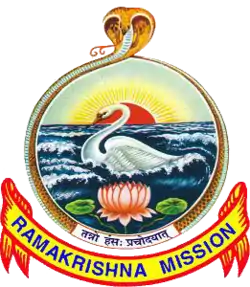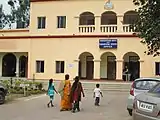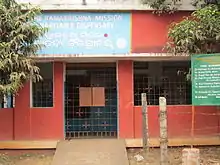Ramakrishna Math and Mission, Bhubaneswar
Ramakrishna Math and Mission, Bhubaneswar is a monastic organization for men brought into existence by Ramakrishna (1836–1886), a 19th-century saint of Bengal. The motto of the Ramakrishna Math and Ramakrishna Mission is: "For one's own salvation, and for the welfare of the world".[1] Sri Ramakrishna Math, Bhubaneswar is the first branch center of the Ramakrishna Order in Odisha. It was started in the year 1919 by Swami Brahmananda, one of the direct disciples of Ramakrishna . Besides Swami Brahmananda, the Math was visited by Swami Shivananda, Swami Premananda, Swami Niranjanananda, and Swami Vijnanananda.
 | |
| Motto | Atmano mokshartham jagat hitaya cha (आत्मनो मोक्षार्थं जगद्धिताय च) (For one’s own salvation and for the welfare of the world) |
|---|---|
| Type | Religious organisation |
| Headquarters | Belur Math, West Bengal, India |
| Location | |
| Coordinates | 20.248755°N 85.836198°E |
| Affiliations | Neo-Vedanta |
| Website | rkmbbsr.org |
History
Swami Brahmananda a direct disciple of Ramakrishna inaugurated the math on 31 October 1919. Brahmananda used to visit Bhubaneswar often and liked its spiritual atmosphere. The Math centre was founded by Swami Brahmananda (a monastic disciple of Sri Ramakrishna) in 1919. The Mission centre was founded in 1920.[2]
Activities of the Math centre
The main activities of Math includes Daily worship, regular religious classes, discourses in and outside the Ashrama. Major festivals include celebration of Kali Puja and the birthdays of some prophets and saints. It also houses a publication department which publishes books in Oriya.
Activities of the Mission centre
The Mission provides services in education and healthcare: a high school with 354 boys and 247 girls, a free students’ home for 60 tribal boys a charitable allopathic dispensary, which treated 15,855 cases, a rural mobile medical unit which treated 5627 cases, a library and a free reading room with 26,904 books and 99 periodicals and newspapers.
Photo gallery
 Universal Temple of Sri Ramakrishna
Universal Temple of Sri Ramakrishna Math complex
Math complex Swami Brahmananda's room
Swami Brahmananda's room Vivekananda hall
Vivekananda hall Math and Mission office
Math and Mission office Vivekananda Library
Vivekananda Library Charitable Dispensary
Charitable Dispensary
References
- Belur Math Website
- Belur Math Website